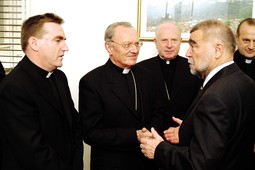Published in Nacional number 698, 2009-03-31
Kaptol seeking 35,000 properties from Croatia
THE CATHOLIC CHURCH is very unhappy that Government is dawdling with the reinstatement of nationalised Church property and the payment of compensation, an obligation it undertook in its agreement with the Vatican on economic issues
 A BINDING AGREEMENT Nacional is the first in Croatia to reveal the agreement that regulates Croatia's financial obligations towards the Catholic ChurchJust in Zagreb Croatia has to return to the Church at least 35 thousand various properties, Nacional has learned from sources close to Government, and the obligation arises from an Agreement on Economic Issues that was signed on 9 October 1998 on behalf of the Republic of Croatia and the Holy See by Jure Radic and Giulio Einaudi respectively. Nacional has this, and all of the other agreements that regulate relations between Croatia and the Holy See in various areas, and which have never before been available to the Croatian public.
A BINDING AGREEMENT Nacional is the first in Croatia to reveal the agreement that regulates Croatia's financial obligations towards the Catholic ChurchJust in Zagreb Croatia has to return to the Church at least 35 thousand various properties, Nacional has learned from sources close to Government, and the obligation arises from an Agreement on Economic Issues that was signed on 9 October 1998 on behalf of the Republic of Croatia and the Holy See by Jure Radic and Giulio Einaudi respectively. Nacional has this, and all of the other agreements that regulate relations between Croatia and the Holy See in various areas, and which have never before been available to the Croatian public.
The content of the Agreement on Economic Issues between the state and the Holy See helps us understand why some Church figures were hurt by the claims of a prodigal Church, and why some Church figures do not feel it is appropriate to reduce the amount of money earmarked in the budget for the Church. One of the possible reasons lies in the inappropriate dynamics of the resolution of the reinstatement of previously seized Church property, which is very precisely set out by the Agreement on Economic Issues, but is not taking place at the pace the two sides agreed on.
The Agreement on Economic Issues obliges the state to reinstate the Church's property, confiscated during the period of Yugoslav Communist rule, which can be reinstated legally, and that it will find an appropriate replacement for those goods that cannot be reinstated, and that it will pay compensation in money to the legal entities set up by the church for the property that will not be reinstated. The state has undertaken the obligation to reinstate to the Church, within a reasonable period of time, the property that can be legally reinstated, but the Agreement does not define what a reasonable period of time is. Six months after the Agreement was signed a commission made up of an equal number of representatives of Government and the Croatian Bishop's Conference was to have compiled a list of property that was to be returned, with indicated deadlines for reinstatement.
By the Agreement the state undertook the obligation to, post-2000, pay an appropriate monetary compensation to the legal entities of the Catholic Church for confiscated goods that cannot be returned, and to do so in four annual instalments. The total sum of the compensation for the confiscated property, which was to be paid in money, was to have been determined by a bipartite Church-State expert commission on the basis of an estimate of the value of these goods, at the latest within a year from the date the Agreement came into force, but Church sources in the know have told Nacional that this has yet to be done.
In line with the same Agreement, the competent state institution undertook the obligation to pay to the Church instalments every three months, to the bank account of the Croatian Bishop's Conference central fund for Church institutions. The central fund was to have passed this money on to the dioceses and to the institutions of religious communities, based on the value of the confiscated property.
Some Church figures criticise Government because it has still not determined the criteria by which the value of confiscated property that is to be reinstated is estimated, on the basis of which the appropriate amount of damages should be paid to the Church. In the Church there is also dissatisfaction because, as a result of vague criteria, the state pays compensation of only 400 kuna per hectare in some cases for  JURE RADIC signed the Agreement on Economic Issues on behalf of Government on 9 October 1998, with Papal Nuncio Giulio Einaudi signing on behalf of the Vaticanconfiscated forestlands, or many times less than the market value for real estate in downtown Zagreb.
JURE RADIC signed the Agreement on Economic Issues on behalf of Government on 9 October 1998, with Papal Nuncio Giulio Einaudi signing on behalf of the Vaticanconfiscated forestlands, or many times less than the market value for real estate in downtown Zagreb.
There have been attempts in the past to have the two sides agree on speeding up the resolution of these issues, but without success. Because of a lack of initiative on the side of the state administration there has been no success so far on a compromise agreement on offsetting the existing claims of the Church. A few years ago Government could have decided to resolve these issues by having the Church relinquish a half of the total value of the property for which it was to receive monetary compensation. Of this remaining half the Church was willing to seek 40 percent right away from the budget, and the remainder over several decades, so as not to overburden the national budget at once.
Instead of accepting this solution, now the problems are solved on an individual basis, and that means through thousands of legal procedures, which burden the judicial administration, and reduce the value of the properties as each procedure is burdened by the costs of lawyers, court experts, surveyors and the like. That is why there are those in the Church who are inclined to some kind of settlement, moreover since there have previously been successful examples of such arrangements.
One way is through mutual grants made by both sides, during which the state granted the Church the former Kralj Tomislav barracks near Crnomerec, now the home of the Croatian Catholic University, while the Church granted to the state a large number of properties in downtown Zagreb, in the "Little Vatican" on the corner of Bauer Street, Vlaska Street and Ratkaj's Alley. In this area hundreds of properties had previously been owned by the Church, but the two sides estimated their total value and decided in the end that they would make mutual grants, as the value of the former military barracks near Crnomerec was about the same as the value of these flats.
Those who understand the issues feel that a settlement would be a good solution because in the current situation a large number of flats and commercial premises, and attractive plots of land in Zagreb are completely unused – no one collects rent, and they cannot be sold. The Church is willing to make compromises in many cases in negotiations on the reinstatement of the property they seek. The Church, for example, once owned the entire park on Zagreb's Ribnjak, with the building there. The Church is not insisting that the park be returned, and wants only to ensure that the park will be well managed. That implies introducing a park warden, quality public lighting, and that it be enclosed again to avoid incidents and fights among intoxicated youth. When the Church was the owner of the Ribnjak park prior to World War II, its was enclosed, but the Partisans took the fence to Belgrade's Kalemegdan after the war, where it remains to this day.
In June of 2003 there was talk of the possibility that the Church receive 25 percent of the shares of insurer Croatia Osiguranje instead of the confiscated property, but that, as a result of obstruction and waffling by both sides, did not materialise. The problems remain, as a result, unresolved and destined to resolution on an individual, as a rule slower, basis.
In spite of this Government has been very considerate, amenable and generous towards the Church in many areas, and not only as regards areas in which wages and pensions are paid to the clergy. It can be said that the Church secured very good forms of assistance in its negotiations with Government a decade ago. But it still cannot get to most of what used to belong to it, and there is no sign of when that might happen.
After Nacional last week gave an extensive analysis of the financial relations between the Church and the State, initiating a broad debate on the subject and provoking many reactions, some newspapers have begun advocating a revision of the Agreement between the State and the Holy See, citing the statements of lawyers, citizens, non-governmental activists and political parties, who feel that the Church is getting to much money and too many favours from the State.
But the many unresolved property relations between the Church and the State indicates that the relations between the two sides are closer than appears at first glance. This all needs to be borne in mind when eventually discussing a possible revision of the contractual relations between the State and the Vatican.
Related articles
Merkel: EU will accept Croatia and no one else
German Chancellor Angela Merkel has put forth a resolute stance in the European Union on the issue of EU enlargement: Croatia will be accepted, and… Više
Latest news
-
28.10.2010. / 14:15
'A profitable INA is in everyone's interest'
-
28.10.2010. / 09:38
Sanader’s eight fear SDP — Won’t bring down Government
-
21.10.2010. / 15:02
Interior Ministry turned a blind eye on Pukanic assassination
-
20.10.2010. / 09:34
Barisic could bankrupt HDZ




